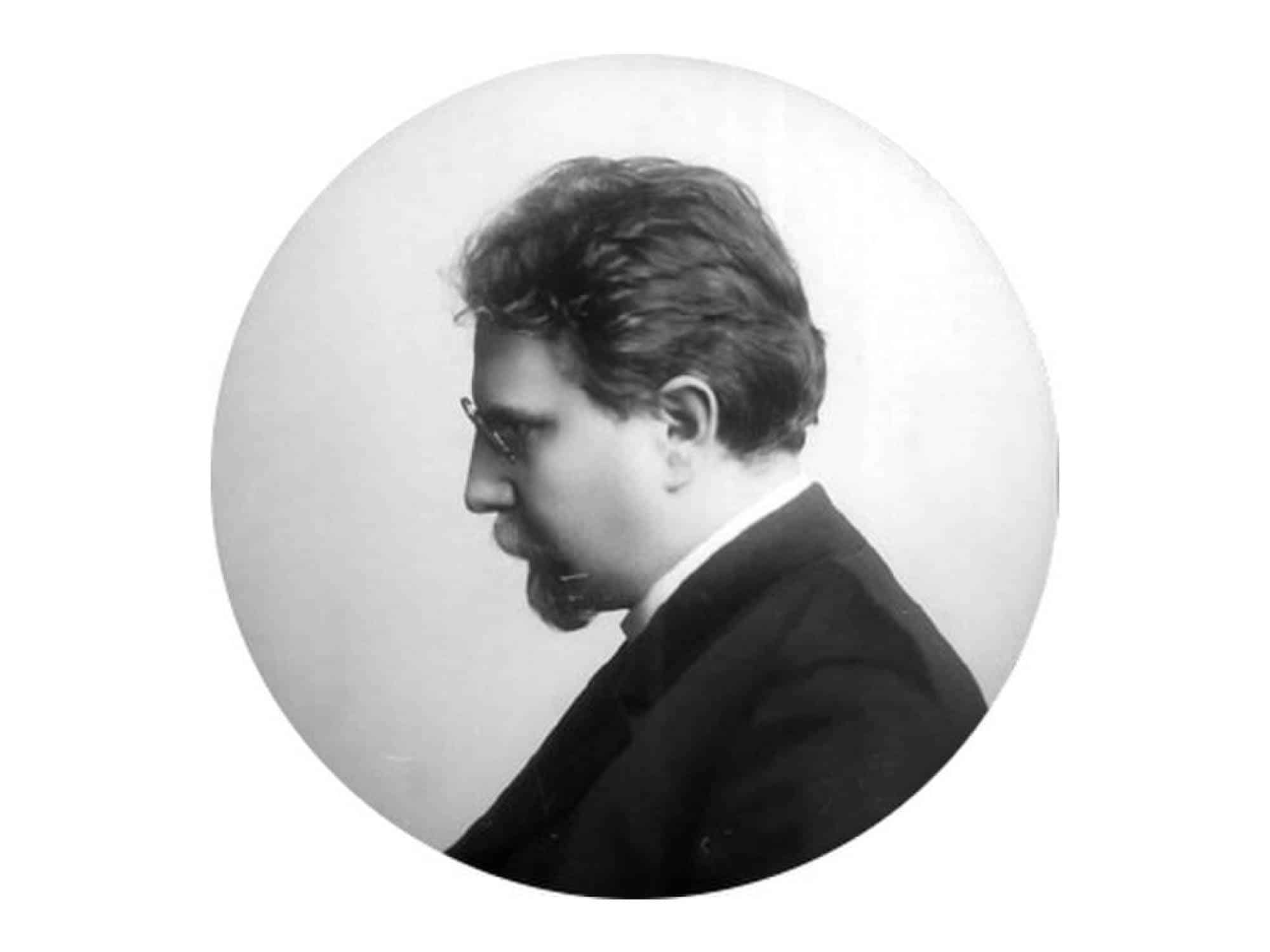The friendship with Otto Erich Hartleben that began in Weimar continued in Berlin. It offered Rudolf Steiner the opportunity to empower himself with a perceptive grasp of the sensory world.
When Rudolf Steiner took over the editorship of the Magazin für Litteratur [Magazine for Literature] in 1897, he was given the condition “that Otto Erich Hartleben should sign and work as co-editor,” as he had a name in the circles associated with the magazine. However, Hartleben’s activities were essentially just limited to lending his name. He himself confessed in his diary in an entry dated July 27, 1897: “I don’t quite see where I could put my hand to it yet, I’m also lazy as usual.”1 However, Hartleben was happy to take on the task of introducing Rudolf Steiner to the various circles of Berlin bohemians from the middle of 1897; among other things, they regularly visited the “Criminal’s Table” founded by Hartleben.2
“You Stole a Sunday from My Sweet”
In turn, Hartleben used Rudolf Steiner, who was living alone at the time, as a kind of postillon d’amour [postman of love]. He had met his childhood sweetheart Ellen Birr again in 1896. In order to arrange a date with her Otto Erich, whom she could not write to at home because of Selma Hartleben, “Ellen, my child” now sent letters and telegrams to Rudolf Steiner. This led to a mishap at the beginning of April 1898, which also illustrates the situation of Rudolf Steiner’s “crisis year.” Hartleben waited in vain one Sunday for news of his beloved (or for the messenger) and, when both failed to materialize, he wrote her a crude letter. But soon, the situation became clearer: When her telegram reached Rudolf Steiner, he hadn’t been at home. He “had forgotten his keys, went to the café with W [Eduard von Winterstein (original editor’s note)], ‘got home’ drunk on Sunday, didn’t even see your telegram lying there (he ‘got home’ at 3 o’clock on Sunday afternoon!).”
And because he was then too late with the corrections for the Magazine for Literature to send them off, he drove himself “Sunday night to Weimar . . . where the magazine will be printed on Monday.” “Monday 11:45 a.m.,” he returned from Weimar, “and finally discovered your telegram from Saturday afternoon on Tuesday morning! A sleight of hand—how?” Hartleben was very depressed that his lover and he “had to lose a day of happiness like this.” Rudolf Steiner apologized in the postscript to the letter: “Please, don’t be angry with me, I want to be good and not do it again. Yours, Rudolf S[teiner].”3
The following day, Hartleben wrote a poem about the dawdling friend:
Rudi Steiner
An old and haggard man sits in purgatory
and wails, while flames of fire, ever anew,
writhe around his bones with unending fury:
Good God, from whence have these flames flew,
These torments under my sinful, pitiful posterior?
For which debt am I condemned its due?
God spoke: Ten years atonement must you meet;
You stole a Sunday from my sweet.4
Noble Epicureanism
During this time, Rudolf Steiner reviewed some of his friend’s pieces in the Magazine for Literature, and in 1899, he very subtly characterized Hartleben’s poetry. Among other things, he says: “His whole personage is attuned to an aesthetically artistic view of the world.”5
Towards the end of 1898, as he gradually overcame his life crisis, he and his circle of friends gradually grew apart. This is already quietly hinted at when Rudolf Steiner writes his review of Hartleben’s one-act cycle Die Befreiten [The Freed]: “I know of no depths of worldview that are not accessible to him. But, he gets quite sickly, if it should first take work, in order to get to the depths. He knows the seriousness of life like no other, but he has the gift of taking this seriousness as lightly as possible. I have never met a person in whom I have found such a noble Epicureanism as he is able to realize. He is a man of pleasure, but the pleasures that he seeks must have exquisite qualities. He is not capable of doing anything remotely reminiscent of the common. All that he does has greatness. And his greatness never gives the appearance of importance. He prefers to make a suitable jest when the others begin to become pathetic and attach lead pellets to their speeches, making them difficult to take.”6
In the fall of 1899, Otto Erich Hartleben informed Rudolf Steiner that he now definitely wanted to resign from the publication of the Magazine for Literature: “I bid you to come to me to agree on the wording of my ‘resignation.’ Otto Erich”7 This means that what Hartleben later circulated—and even reported to Elisabeth Förster-Nietzsche—that he had resigned because of Rudolf Steiner’s article “Das Nietzsche-Archiv und seine Anklagen gegen den bisherigen Herausgeber” [The Nietzsche Archive and Its Accusations against the Previous Editor] was not true.8
The dedication in the second edition of the Goethe Breviary in 1901, already mentioned in the previous marginalia,9 should perhaps also be seen in this context as a conciliatory gesture by Hartleben.
After the great success of his comedy Rosenmontag [Rose Monday], Hartleben was able to buy a villa on Lake Garda, Italy, where he lived from then on with Ellen Birr and, in 1904 founded a Halkyonian Academy for Unapplied Sciences in Salò [Halkyonische Akademie für unangewandte Wissenschaften zu Salò], whose members included a number of his old friends. But, he died on February 11, 1905, at the age of 40, after suffering a hemorrhage—probably a consequence of his lifelong excessive consumption of alcohol.
What happened after his death was in keeping with his love of irony and satire. The wake took place in his wine cellar. During the course of the long night, it occurred to the guards that they should help themselves to the rich supply, as the dead man was no longer able to. So the next day, the drunken guards stumbled with the coffin, which tried to slip out of their hands several times, to the boat that was to take the body across Lake Garda.
Hartleben had ordered that his head should be buried in Germany and his body in Italy. This imposed the unpleasant duty of separating the head from the torso on a Munich doctor friend of his. With the head under his arm, the doctor returned to an osteria [small wine café], as he later told Max Halbe. He “placed the newspapered package next to him on the table and ordered a fiasco [flagon] of fiery red. A lively discussion quickly got underway with other guests from the table, tempers flared, pithy Italian fists thudded on the wooden tabletop, the mysterious parcel bounced back and forth a few times, and sprang under the bench with one leap. The guests of the osteria set about looking for it, and lo and behold, the wrapping paper had come loose, and Otto Erich’s head was staring at the cheerful group of revelers with a last sympathetic, satirical smile. At least that’s how Dr. Lehmann . . . believed he could interpret the expression of his departed friend. Perhaps he was right.”10
Experience of the Abyss
Rudolf Steiner met Otto Erich Hartleben at a time in his life when he realized that he was lacking something, namely, that he could not easily connect with the physical world.11 He began, especially in his last Weimar period, to turn consciously to what the sensory world had to say—without always looking at the spiritual background at the same time. With regard to one particular aspect, he could find no better guide than Otto Erich Hartleben, who was so resolutely devoted to the sensual side of life. In the last Weimar period and the first Berlin period, Rudolf Steiner allowed himself to become completely involved for a while until he had immersed himself in this world and gotten to know it thoroughly. This became a test for him, an experience of the abyss, which he had to overcome step by step in the years around the turn of the century in order to achieve his true mission in life.
Despite this, he remained committed to his spiritual concerns during this time—even if they, perhaps, faded into the background for a while. Looking back, in a letter to Anna Steiner dated February 14, 1905, he commented on this side that he could get to know, especially through Otto Erich Hartleben, as follows: “I have never been interested in anything other than spiritual matters. And, if it seemed otherwise, at the time when I was first in Berlin, that is yet but a mistake. At that time, I wanted to honestly get to know the literature of young people. I ought, therefore, not to have involved myself in the dregs of these young people. But that was an honest mistake. And I had to atone for it with some really dirty gossip.”12
Translation Joshua Kelberman
Image Portrait of Otto Erich Hartleben, dated 1901
Footnotes
- Otto Erich Hartleben, Tagebuch: Fragment eines Lebens [Diary: Fragment of a Life] (Munich: Langen, 1906), pp. 264 f.
- Rudolf Steiner looks back on this in his lecture of Oct. 27, 1918: “Through my friendship with Otto Erich Hartleben, at that time, I actually came into contact with all, or at least with a large number, of the young, up-and-coming literary figures, most of whom have now already faded away again. Whether I fit into this society or not is not for me to decide. One of the members of this society recently wrote an article . . . in which he tries to prove, with a certain pedantry, that I may not have fit into this society and may have excluded myself like a ‘free-wheeling, unsalaried scholar of God’ . . . .” Rudolf Steiner, From Symptom to Reality in Modern History, CW 185 (Forest Row, East Sussex: Rudolf Steiner Press, 2015), lectures in Dornach from Oct. 18–Nov. 2, 1918.
- Fred B. Hardt, ed., Briefe von Otto Erich Hartleben an seine Freundin 1897–1905 [Letters from Otto Erich Hartleben to His Girlfriend 1897–1905 (Dresden: Reissner, 1910), p. 41.
- Ibid, p. 42; German original: Rudi Steiner / Im Fegefeuer sitzt ein hagrer Greis / und jammert, während ewig frische Flammen / um sein Gebein mit ungebrochnem Fleiß / sich schlängeln: Gütiger Gott, woher entstammen / die Qualen unter meinem Sündensteiß? / Ob welcher Schuld tatst Du mich so verdammen? / Gott sprach: zehn Jahre musst Du also büßen: / Du raubtest einen Sonntag meiner Süßen.
- Rudolf Steiner, Biographien und biographische Skizzen 1894–1905 [Biographies and biographical Sketches 1984–1905], GA 33, 2nd edn. (Dornach: Rudolf Steiner Verlag, 1992), pp. 142 f.
- Rudolf Steiner, Gesammelte Aufsätze zur Dramaturgie 1889–1900 [Collected Essays on Dramaturgy 1889–1900], GA 29 (Basel: Rudolf Steiner Verlag, 2014), pp. 303 f.
- Postcard from November 1, 1899, Rudolf Steiner Archive, Dornach.
- To Hans von Müller, February 15, 1900: “The Förster-Nietzsche gossip from Steiner is completely substandard—I have declared my definitive withdrawal from the publication. If you write to Weimar, please mention this.” Letter in the recipient’s estate, Berlin Central and Regional Library [Zentral- und Landesbibliothek Berlin], Sign. EH 6867; Rudolf Steiner, “Das Nietzsche-Archiv und seine Anklagen gegen den bisherigen Herausgeber” [The Nietzsche Archive and Its Accusations against the Previous Editor], in Gesammelte Aufsätze zur Kultur- und Zeitgeschichte 1887-1901 [Collected Essays on Cultural and Contemporary History 1887–1901], GA 31, 3rd edn. (Dornach: Rudolf Steiner Verlag, 1989); first published in Magazin für Literatur [Magazine for Literature] 69, nos. 6, 10 (Feb. 1900).
- See Martina Maria Sam, “Otto Erich Hartleben and Rudolf Steiner. Part 1: In Weimar,” the Goetheanum Weekly, Issue 42, footnote 12.
- Max Halbe, Jahrhundertwende: Zur Geschichte meines Lebens, 1893–1914 [Turn of the century: the story of my life, 1893–1914] (Salzburg 1945), pp. 311 f.
- “The experience of that which can be experienced in the spiritual world was always self-evident; the perceptive grasping of the sensory world offered me the greatest difficulties. It was as if I couldn’t pour the soul’s experience into the sense organs far enough in order to be able to fully connect what, with the soul, they experienced.” Rudolf Steiner, Autobiography: Chapters in the Course of My Life, 1861–1907, CW 28 (Great Barrington, MA: SteinerBooks, 2005), p. 163.
- Rudolf Steiner, Sämtliche Briefe: Frühe Berliner Zeit, 10. Juni 1897–12. Januar 1905 [Collected Letters: Early Berlin Period, June 10, 1897–January 12, 1905], vol. 3, GA 38/3 (Basel: Rudolf Steiner Verlag, 2024).









